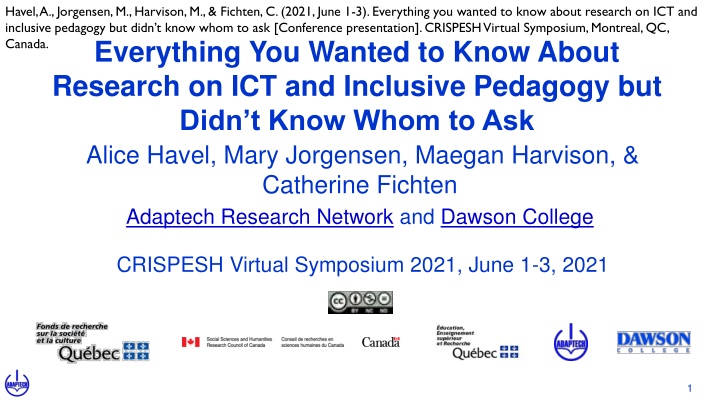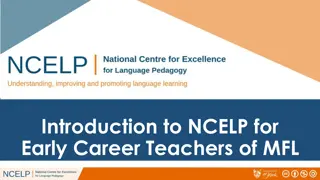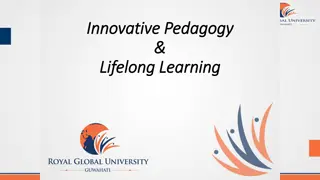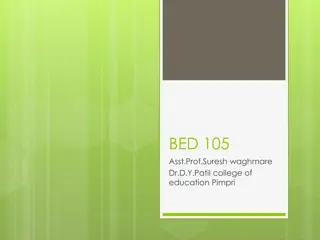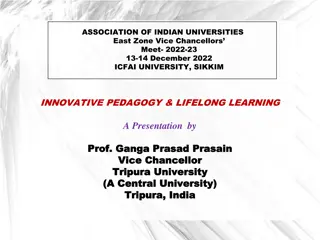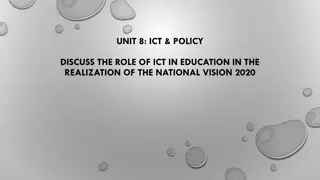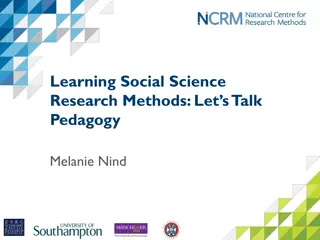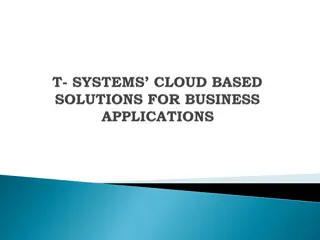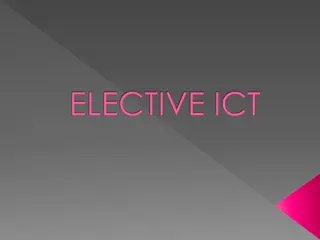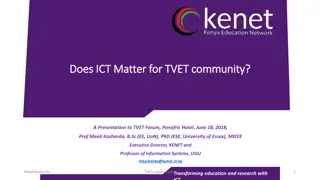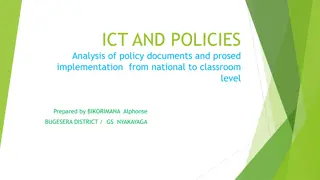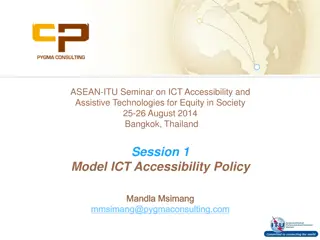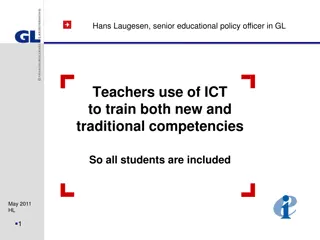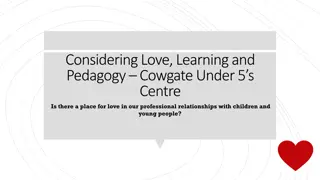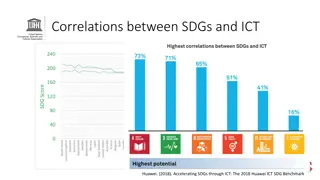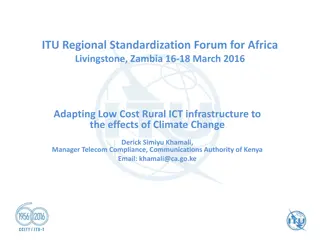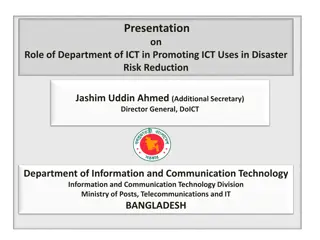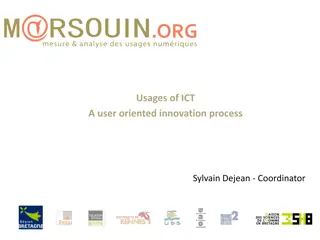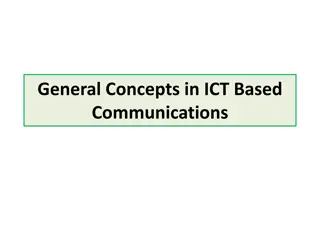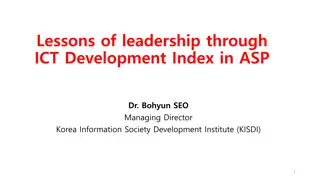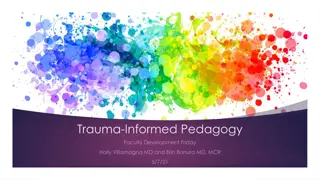Research on ICT and Inclusive Pedagogy: Insights and Implications
Research findings from the Adaptech Research Network on post-secondary students with disabilities, focusing on ICT, inclusive pedagogy, and accessibility in education. Discover benefits of applied research, statistics on student disabilities, and implications for disability services in institutions.
Download Presentation

Please find below an Image/Link to download the presentation.
The content on the website is provided AS IS for your information and personal use only. It may not be sold, licensed, or shared on other websites without obtaining consent from the author.If you encounter any issues during the download, it is possible that the publisher has removed the file from their server.
You are allowed to download the files provided on this website for personal or commercial use, subject to the condition that they are used lawfully. All files are the property of their respective owners.
The content on the website is provided AS IS for your information and personal use only. It may not be sold, licensed, or shared on other websites without obtaining consent from the author.
E N D
Presentation Transcript
Havel, A., Jorgensen, M., Harvison, M., & Fichten, C. (2021, June 1-3). Everything you wanted to know about research on ICT and inclusive pedagogy but didn t know whom to ask [Conference presentation]. CRISPESH Virtual Symposium, Montreal, QC, Canada. Everything You Wanted to Know About Research on ICT and Inclusive Pedagogy but Didn t Know Whom to Ask Alice Havel, Mary Jorgensen, Maegan Harvison, & Catherine Fichten Adaptech Research Network and Dawson College CRISPESH Virtual Symposium 2021, June 1-3, 2021 1
Agenda Overview of Adaptech Research Network / R seau de Recherche Adaptech Presentation of research findings Discussion of findings Implications Conclusions 2
What is Adaptech? Adaptech Research Network Team of teachers, professionals, students, researchers Conducts research on post-secondary students with a variety of disabilities Focus on information and computer technologies Based at Dawson College 3
About the Research Empirical Bilingual International: 5 countries Methods: qualitative, quantitative, archival Research grants SSHRC FRQSC MEES ECQ 4
Benefits of Applied Research Expands knowledge base Informs best practices Gives stakeholders a voice Provides data for lobbying Guides policy 5
Accessibility and Post-Secondary Education 17% of students self-reported a disability1 50% have multiple disabilities6 66% do not register with accessibility services Most frequent disabilities reported LD / ADHD Mental health problems Chronic health problems Sensory and mobility related disabilities 10
Extended Time Works Well for Everyone Effect of extra time on results of a reading comprehension test2 45 Mean Score 40 35 30 25 10 min 20 min Time With LD Without LD 7
Implications (1) Disability services statistics not reflective of institution s realities Multiple disabilities Accommodations should be based on functional limitations Self-report Difficulties obtaining documentation 8
Implications (1, contd) Mental health most prevalent disability Suitable accommodations not obvious Need UD model Accommodations model excludes many students with diverse needs Extended time can level the playing field 9
Use of Personal Technology in Class3 50% I like courses where my teacher allows me to use personal technology in class 40% 40% My teachers allow me to use personal technology in class 30% 30% 27% 22% 21% 21% 20% 13% 11% 10% 6% 5% 2% 2% 0% Strongly Disagree Moderately Disagree Slightly Disagree Slightly Agree Moderately Agree Strongly Agree 10
Technology that Worked Well Presentation software Notes posted online Videos Grades posted online 11
Technology That Did not Work Well Presentation software Teachers use and knowledge of technology Online communication Performance of technology at school 12
Implications (2) Differences between students with and without disabilities not significant Mainstream technology preferred by students UD features in ease of use, etc. No longer an accommodation Student does not stand out as different Faculty do not have to be experts If you use it, do it well Only use it if has purpose 13
Use of Mobile Technology in Class Teacher s use of mobile technology4 Polling / online quizzes Group work Class activities Ask students to do research to answer questions Use smartphones built-in geography tools Have students write notes on their devices and flip these directly onto a SMART board 14
Use of Mobile Technology in Class (contd) Student use of mobile technology5 Following along with the PowerPoint Take pictures of PowerPoint slides Group work Add information to interactive whiteboards 15
Tip Sheets about the Use of Smartphones Beyond texting: How students can use smartphones outside of the classroom Play it again: Using students smartphones for audio recordings Using students smartphones for collaborative work Simple but effective: Using students smartphones to watch videos 16
Videos about the use of Smartphones Logistics of using smartphones In the classroom The classics of polling using smartphones Using Moodle app on smartphones for assessments 17
Discussion Questions (1) 1) Do you generally allow students to use their smartphones in the classroom? 2) What are your reasons for and against the use of smartphones? 3) How have you tried to incorporate smartphones in your pedagogy? 4) Have you seen any creative ways that students have used smartphones to do their schoolwork? 18
Implications (3) Smartphone popular Portable Always with the student One gateway to multiple means of Engagement Representation Expression 19
Implications (3, contd) Faculty need to be supported in use of smartphones as pedagogical tools Explanations available online when needed Short and simple instructions Various formats (video, tip sheets, etc.) 20
Covid-19 Pandemic Method6 Goal What technologies are used to do schoolwork Method 163 students with disabilities 74 students without disabilities LimeSurvey 21
Covid-19 Pandemic - Results Zoom can include captions ( craptions ) Google Docs speech-to-text, collaboration Microsoft Teams transcription (with Stream) Office suites (Google, Microsoft) 22
Covid-19 Pandemic - Conclusions Most worked well For both groups of students But Zoom related-problems for over 33% of students Microsoft Teams: problems for approximately 50% students with disabilities More students with disabilities had problems 23
Discussion Questions (2) 1) What influence, if any, has COVID 19 had on your definition of inclusion? 2) What impact has COVID 19 had on inclusive pedagogy? 24
Implications (4) New diversity-related barriers have arisen Accessibility issues for diverse learners emerging as a institutional concern Certain accommodations no longer required with online courses 25
Goodbye and Thanks! Adaptech Research Network: www.adaptech.org Alice Havel: ahavel@dawsoncollege.qc.ca Catherine Fichten: catherine.fichten@mcgill.ca Mary Jorgensen: mjorgensen@dawsoncollege.qc.ca 26
References 1) Fichten, C. S., Havel, A., King, L., Jorgensen, M., Budd, J., Asuncion, J., Nguyen, M. N., Amsel, R., & Marcil, E. (2018). Are you in or out? Canadian students who register for disability-related services in junior/community colleges versus those who do not. Journal of Education and Human Development, 7(1), 166-175. http://dx.doi.org/10.15640/jehd.v7n1a19 2) King, L., Nguyen, M. N., & Fichten, C. S. (2014, octobre). Les tudiants avec troubles d apprentissage face aux technologies de l information : Activit de transfert des connaissances [Invited speaker]. Fonds de recherche du Qu bec Soci t et culture (FRQSC) et le minist re de l ducation et de l Enseignement sup rieur (MEES), Qu bec, Qu bec. 3) Fichten, C. S., King, L., Jorgensen, M., Nguyen, M. N., Budd, J., Havel, A., Asuncion, J., Amsel, R., Raymond, R., & Poldma, T. (2015). What do college students really want when it comes to their instructors use of information and communication technologies (ICTs) in their teaching? International Journal of Learning, Teaching and Educational Research, 14(2), 173-191. 4) Fichten, C., Havel, A., King, L., & Jorgensen, M. (2019, November). Mobile tech use by Dawson students with disabilities. The Bulletin Psych & Anthro, 4, 5. 27
References Contd 5) Fichten, C., Jorgensen, M., King, L., Harvison, M., & Havel, A. (2019, April). What they do and what they can do: Taking advantage of Social-Science students personal mobile technologies in class. The Bulletin Psych & Anthro, 3, 3. 6) Fichten, C., Jorgensen, M., Havel, A., Legault, A., & Budd, J. (in press). Academic performance and mobile technology use during the COVID-19 pandemic: A comparative study. Journal of Postsecondary Education and Disability. 28
